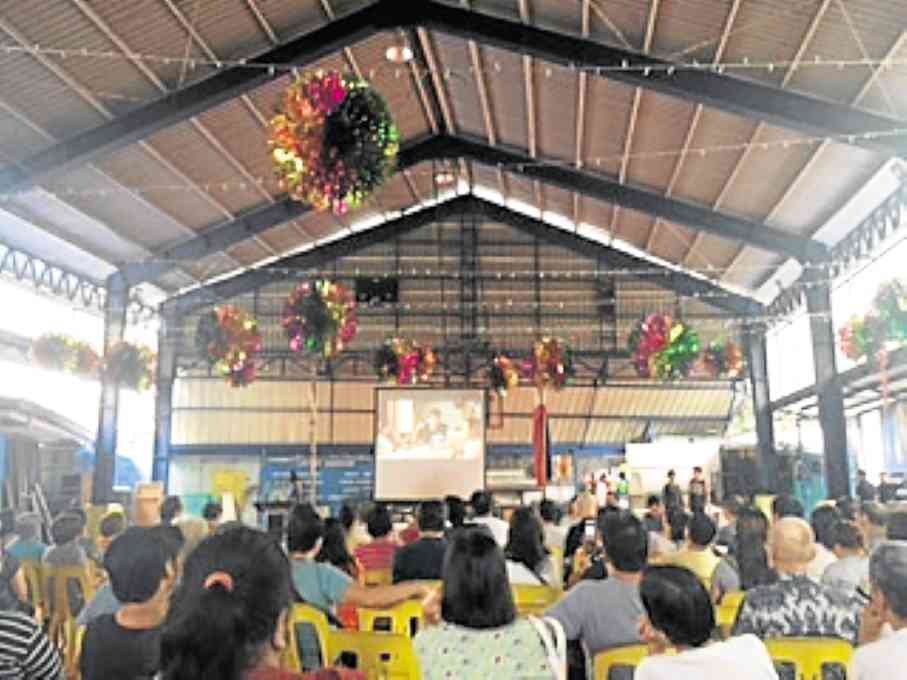QCPD consultative meeting on drug war turns into discussion on human rights
A meeting between the Quezon City Police District (QCPD) and Barangay Teachers Village East residents turned into a discussion about human rights and the constitutionality of the government’s war on drugs after questions were raised on the rising number of extrajudicial killings (EJKs).
QCPD director Chief Supt. Guillermo Lorenzo Eleazar, however, was quick to assuage homeowners’ fears over the possible violation of their human rights under “Oplan Taphang.” His replies, however, failed to reassure some residents.
The consultative meeting was called by barangay officials on Saturday, with Eleazar presenting the city’s antidrug programs. Vice Mayor Joy Belmonte and Councilor Gian Carlo Sotto were also present.
While Eleazar’s presentation took nearly two hours, the meeting held in the barangay hall covered court stretched to over three hours due to the many questions posed by attendees during the open forum.
Residents of Teachers Village East include academicians and students from the nearby University of the Philippines, as well as activists, lawyers and other professionals.
Jet Urmeneta, who has lived in the area for over two decades, asked: “If you have this comprehensive program for [illegal] drugs, what is your program to promote human rights in Quezon City?”
Eleazar responded by saying that the city “also has programs on poverty alleviation… We also have the integrated drug abuse profiling system so we can understand the needs of drug surrenderers better.”
Unprepared
“This [anti-illegal drug] campaign is unprecedented, all of us are not ready,” he admitted as he pointed to the lack of jails and rehabilitation centers for drug users and pushers. “But the national government is doing its best [to address the problem,]” Eleazar said.
For her part, Belmonte said the city government was planning to release a “thick manual” or primer on human rights education early next year upon the request of several residents.
Another homeowner questioned the rise in EJK cases, particularly in poor communities in the city.
Eleazar first stressed that police buy-bust operations were different from vigilante killings. As of Saturday, 232 drug suspects had been killed in “armed encounters” with the city police since July.
“Sad to say, the number of EJK cases has risen, but I assure you that the police and the government do not condone these,” he said.
Several residents, meanwhile, criticized the government’s earlier version of the drug war, “Oplan Tokhang,” after a draft Senate report revealed that it may actually be unconstitutional.
But Eleazar replied: “Is there anything in the Constitution that prohibits us from knocking on doors?”
He stressed that it was up to residents whether or not to let the police in. “The point is as long as you are not doing anything wrong, then you should not be afraid,” he said.
Learning experience
Asked for comment, Urmeneta told the Inquirer that while the meeting was a “learning experience,” it raised more concerns among residents.
Lawyer Mel Asuncion, who was also present, said, “What it shows is that they’re cutting corners… They came out with this program (Tokhang) with no controls in place.”
She said that while the intention of combating illegal drugs was good, the information campaign should be scaled up to reach more depressed areas. Asuncion also added that human rights must be incorporated into the police’s framework of operations.
For the two longtime residents of the city, Urmeneta and Asuncion admitted that they do not feel any safer despite the government’s pronouncements that the drug war was meant to eradicate crime.
Eleazar said he welcomed the questions and active participation of the residents.
But he noted that not everything was under the police’s jurisdiction. For instance, he said the police do not have a “well-established venue” for human rights advocacy.
“But we tell our personnel to strictly observe human rights and we will also have more engagement with the community,” he said, adding that other concerns may be addressed by the city government, and not just the police.
“Our mandate is complicated, but we will continue to do our job,” he said.















